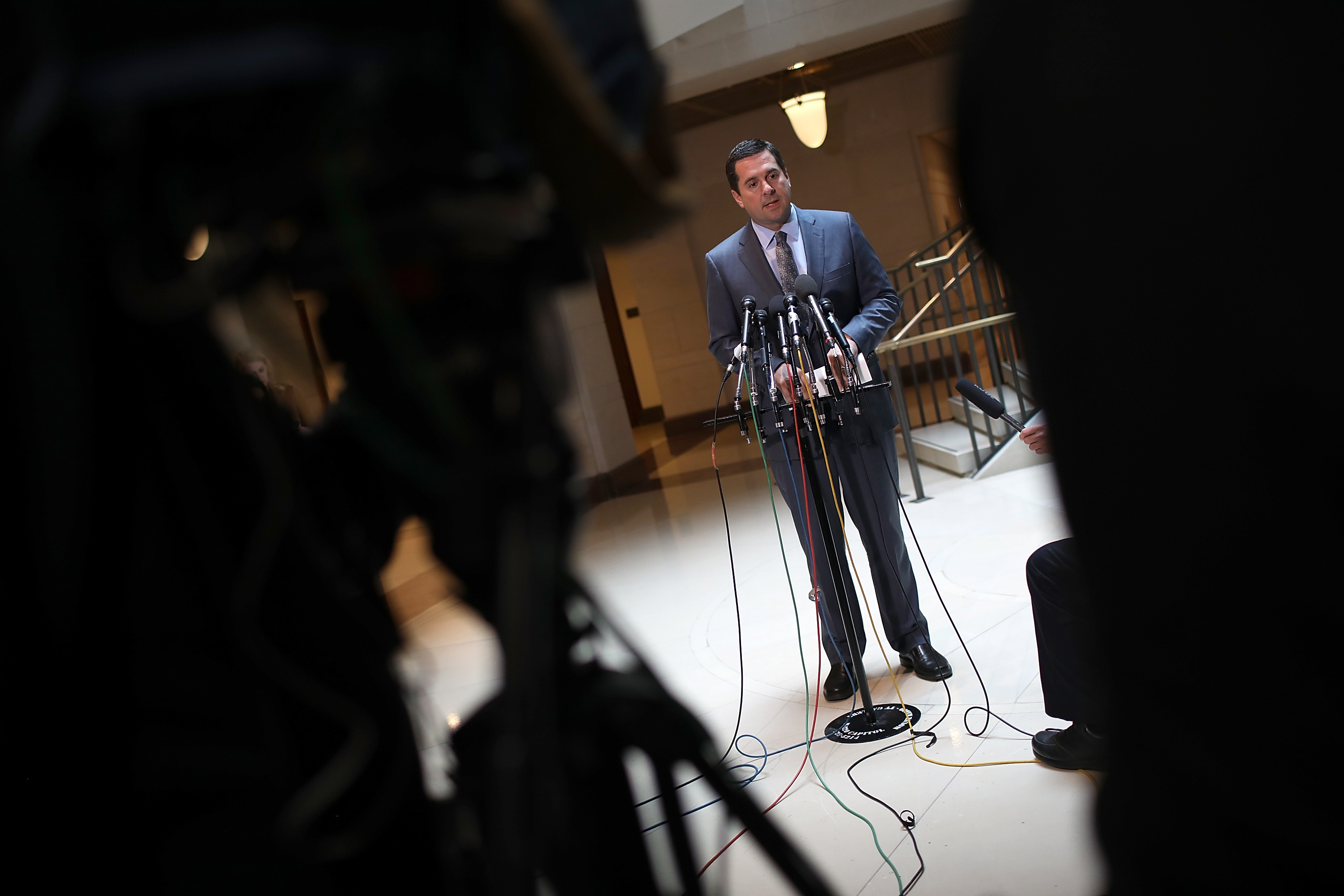6 major criticisms of the Nunes memo
Critics of the Nunes memo are hopping mad. Here's why.


On Friday, President Trump authorized the release of a controversial memo compiled by Republicans on the House Intelligence Committee. The so-called Nunes memo purports to show that high-ranking officials in the FBI and Department of Justice were biased against President Trump, used Democratic-funded opposition research to obtain a warrant to surveil Carter Page, a one-time member of the Trump campaign, and then tried to cover it all up. It's quite the conspiracy.
Even prior to its release, the memo was the focus of fevered debate and obsessive scrutiny — not to mention ferocious criticism. The FBI, in a rare public statement, expressed its "grave concerns" about the memo's accuracy. Democratic leaders went so far as to call on House Speaker Paul Ryan (R-Wis.) to remove Intelligence Committee Chairman Devin Nunes (R-Calif.), whose staff wrote the memo.
Why are critics so worked up over the Nunes memo? Here are six of their biggest problems with the House Republicans' purported bombshell.
The Week
Escape your echo chamber. Get the facts behind the news, plus analysis from multiple perspectives.

Sign up for The Week's Free Newsletters
From our morning news briefing to a weekly Good News Newsletter, get the best of The Week delivered directly to your inbox.
From our morning news briefing to a weekly Good News Newsletter, get the best of The Week delivered directly to your inbox.
1. What the memo says: "On October 21, 2016, DOJ and FBI sought and received a FISA probable cause order (not under Title VII) authorizing electronic surveillance on Carter Page from the FISC."
What critics say: By October 2016, Carter Page was no longer even working for Trump's campaign.
"Page had left the Trump campaign at least a month before the application," Vox writes. "That's the first red flag that there's nothing here, as an FBI campaign to undermine Trump's campaign would almost certainly involve targeting someone who was actually working on it."
2. What the memo says: The "dossier" compiled by Christopher Steele (Steele dossier) on behalf of the Democratic National Committee (DNC) and the Hillary Clinton campaign formed an essential part of the Carter Page FISA application."
A free daily email with the biggest news stories of the day – and the best features from TheWeek.com
What critics say: As my colleague Damon Linker writes, the FBI almost certainly had other sources corroborating the Steele dossier, though the Nunes memo makes no mention of them.
The FBI knew that the dossier compiled by former British intelligence officer Christopher Steele (and apparently paid for by the Clinton campaign by way of research firm Fusion GPS) was raw intelligence. It is highly implausible (to put it mildly) that the FBI asked a FISA court to issue or renew a warrant for surveillance, let alone that the warrant was granted by that court, based solely on such intelligence without independent verification from other (probably clandestine) sources. That is most likely one reason why the FBI objects so strongly to the release of the Nunes memo — because it highlights the use of material from the Steele dossier in the FISA application without referring to additional corroborating information that was gathered elsewhere and that the FBI can't divulge without the risk of revealing where it came from. [The Week]
Also critical: Officials had Page on their radar long before the Steele dossier existed.
In 2013, "Page met with one of three Russians who were eventually charged with being undeclared officers with Russia's foreign intelligence service, known as the S.V.R.," The New York Times writes. "The FBI interviewed Mr. Page in 2013 as part of an investigation into the spy ring, but decided that he had not known the man was a spy, and the bureau never accused Mr. Page of wrongdoing."
And about that Democratic funding ...
3. What the memo says: "Steele was a longtime FBI source who was paid over $160,000 by the DNC and Clinton campaign, via the law firm Perkins Coie and research firm Fusion GPS, to obtain derogatory information on Donald Trump's ties to Russia."
What critics say: The Fusion GPS dossier actually began as Republican opposition research on Trump.
The conservative Washington Free Beacon, funded by a donor of Sen. Marco Rubio (R-Fla.), hired Fusion GPS to "unearth potentially damaging information about Mr. Trump" during the Republican primaries, The New York Times reports. The Free Beacon ended its work with Fusion GPS in May 2016, as it became clear Trump was the favorite for the nomination. "After Mr. Trump secured the nomination, Fusion GPS was hired on behalf of Mrs. Clinton's campaign and the DNC by their law firm, Perkins Coie, to compile research about Mr. Trump, his businesses, and associates — including possible connections with Russia," the Times adds. That is when Steele was brought on board.
4. What the memo says: "The FBI and DOJ obtained one initial FISA warrant targeting Carter Page and three FISA renewals from the FISC."
What critics say: Top law enforcement officials did reapprove surveillance of Page. The memo implies "that these people were either incompetent, because they failed to notice the omissions [about the involvement of 'political actors'] in the application, or complicit in an effort to deceive the court," Vox writes.
While we don't know why the FISA warrant was reapproved three times, we do know that it would be "if you have new information justifying the original probable cause and the [government's] need to listen," CNN analyst Asha Rangappa tweeted. And remember, as The Washington Post, does: "Page had reportedly been on law enforcement’s radar for years due to his mingling with Russians." Would it really be surprising if the FBI had lots of good reasons to surveil him and the Nunes memo just conveniently left them out?
5. What the memo says: "The Page FISA application also mentions information regarding fellow Trump campaign adviser George Papadopoulos, but there is no evidence of any cooperation of conspiracy between Page and Papadopoulos. The Papadopoulos information triggered the opening of an FBI counterintelligence investigation in late July 2016 by FBI agent Pete Strzok."
What critics say: The memo's claims about the Steele dossier sparking everything seem nonsensical in this light. The memo itself says that it was counterintelligence stemming from the activities of campaign adviser George Papadopoulos that officially led the FBI to open an investigation.
"While the dossier may have played a critical role in putting Page under surveillance in October, the document — containing some salacious claims about Trump — was not the driving force behind the FBI's scrutiny of the Trump team," Politico concludes.
6. What the memo says: "Our findings, which are detailed below, 1) raise concerns with the legitimacy and legality of certain DOJ and FBI interactions with the Foreign Intelligence Surveillance Court (FISC), and 2) represent a troubling breakdown of legal processes established to protect the American people from abuses related to the FISA process."
What critics say: In fact, these findings are never convincingly reached:
Jeva Lange was the executive editor at TheWeek.com. She formerly served as The Week's deputy editor and culture critic. She is also a contributor to Screen Slate, and her writing has appeared in The New York Daily News, The Awl, Vice, and Gothamist, among other publications. Jeva lives in New York City. Follow her on Twitter.
-
 A running list of the US government figures Donald Trump has pardoned
A running list of the US government figures Donald Trump has pardonedin depth Clearing the slate for his favorite elected officials
-
 Ski town strikers fight rising cost of living
Ski town strikers fight rising cost of livingThe Explainer Telluride is the latest ski resort experiencing an instructor strike
-
 ‘Space is one of the few areas of bipartisan agreement in Washington’
‘Space is one of the few areas of bipartisan agreement in Washington’Instant Opinion Opinion, comment and editorials of the day
-
 Bari Weiss’ ‘60 Minutes’ scandal is about more than one report
Bari Weiss’ ‘60 Minutes’ scandal is about more than one reportIN THE SPOTLIGHT By blocking an approved segment on a controversial prison holding US deportees in El Salvador, the editor-in-chief of CBS News has become the main story
-
 Has Zohran Mamdani shown the Democrats how to win again?
Has Zohran Mamdani shown the Democrats how to win again?Today’s Big Question New York City mayoral election touted as victory for left-wing populists but moderate centrist wins elsewhere present more complex path for Democratic Party
-
 Millions turn out for anti-Trump ‘No Kings’ rallies
Millions turn out for anti-Trump ‘No Kings’ ralliesSpeed Read An estimated 7 million people participated, 2 million more than at the first ‘No Kings’ protest in June
-
 Ghislaine Maxwell: angling for a Trump pardon
Ghislaine Maxwell: angling for a Trump pardonTalking Point Convicted sex trafficker's testimony could shed new light on president's links to Jeffrey Epstein
-
 The last words and final moments of 40 presidents
The last words and final moments of 40 presidentsThe Explainer Some are eloquent quotes worthy of the holders of the highest office in the nation, and others... aren't
-
 The JFK files: the truth at last?
The JFK files: the truth at last?In The Spotlight More than 64,000 previously classified documents relating the 1963 assassination of John F. Kennedy have been released by the Trump administration
-
 'Seriously, not literally': how should the world take Donald Trump?
'Seriously, not literally': how should the world take Donald Trump?Today's big question White House rhetoric and reality look likely to become increasingly blurred
-
 Will Trump's 'madman' strategy pay off?
Will Trump's 'madman' strategy pay off?Today's Big Question Incoming US president likes to seem unpredictable but, this time round, world leaders could be wise to his playbook
